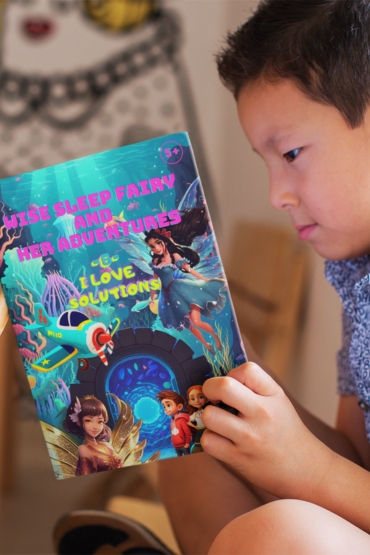As parents, we strive to equip our children with the tools they need to navigate life’s challenges with confidence and resilience. One invaluable skill that holds the key to their success is the ability to adopt a solution-focused approach. In today’s fast-paced world, where problems abound and uncertainties loom, instilling this mindset in our children becomes more crucial than ever. It’s about teaching them not just to see obstacles but to uncover opportunities, not merely to dwell on setbacks but to focus on solutions.
In the journey of nurturing young minds, the focus on solutions over problems becomes a guiding principle. By fostering a solution-focused mindset in your children, you empower them to approach life’s challenges with resourcefulness. This article delves into what a solution-focused approach entails, why it is crucial to shift the focus from problems to solutions, the importance of teaching a solution-focused approach to children, exploring how it shapes their cognitive development and sets the stage for a future filled with possibilities.
Table of Contents
Understanding the Solution-Focused Approach for Children
What is a solution-focused approach for children?
In child development, the solution-focused approach emerges as a guiding light, illuminating the path toward resilience, empowerment and a future filled with endless possibilities. But what exactly does this approach entail for our young ones? Simply put, a solution-focused approach for children revolves around nurturing their innate ability to seek out solutions rather than dwell on problems. It encourages them to view challenges as opportunities for growth, cultivating a mindset of optimism and resourcefulness from an early age.
As parents, our greatest gift to our children is the ability to see beyond problems and embrace the power of solutions
At its core, the solution-focused approach empowers children to become active participants in shaping their own narratives. It teaches them to identify their strengths, leverage their resources, and envision a future filled with possibilities. By fostering this mindset, you equip your children with a valuable toolkit for navigating the complexities of life with confidence and resilience.

Development of Problem-Solving in Young Children
Children, from a very young age, are natural problem solvers. As they navigate the world around them, the development of problem-solving skills, a critical cognitive skill that lays the foundation for their future success. From the moment they begin to explore their environment, young children engage in problem-solving activities, gradually honing their abilities to overcome obstacles and find solutions. Through nurturing and guidance, you play a pivotal role in fostering this essential skill, empowering your children to tackle challenges with confidence and resilience.
- Problem-solving is a foundational cognitive skill that develops early in childhood.
- Young children engage in problem-solving activities as they navigate their environment and interact with others.
- These experiences help them learn to identify challenges, focus on solutions, and explore different solutions, and make decisions.
- Problem-solving skills lay the groundwork for future success and social adaptation.
- Research suggests that children who excel in problem-solving demonstrate higher levels of resilience and emotional intelligence.
- By nurturing problem-solving abilities in young children, you can empower your child to approach challenges with confidence and creativity in an ever-changing world.
- Through playful activities and guided exploration, you can support your child’s problem-solving development in everyday situations.
- Teaching problem-solving as a critical cognitive skill sets children on a path towards lifelong learning and adaptability.
As we celebrate their successes and support them through their struggles, let us remember the profound impact that fostering problem-solving abilities can have on their journey towards becoming confident, capable individuals.
By fostering a solution-focused mindset in our children, we plant the seeds of resilience that will bloom into lifelong success
The Theme of “Focus on Solutions”
Importance of Focusing on Solutions
As we navigate the journey of raising our children, it becomes increasingly apparent that the way we frame problems profoundly impacts their mindset and outlook on life. By shifting our focus from dwelling on problems to embracing solutions, we empower our children to approach adversity with resilience and optimism. In this way, they learn to see challenges as opportunities for growth and learning. Moreover, they learn to approach difficulties with determination and resourcefulness, rather than feeling overwhelmed or defeated. And, they become adept at brainstorming creative solutions, evaluating their options, and implementing effective strategies to address challenges. Rather than relying solely on others for solutions, they learn to identify problems and proactively seek out ways to resolve them.

To focus on solutions can contribute to children’s emotional well-being. When they feel capable of overcoming obstacles, they experience a sense of confidence and self-efficacy, which can lead to greater overall happiness and satisfaction. Through our actions and words, we have the power to shape their mindset and instill in them a belief in their own abilities. In essence, teaching children to focus on solutions instills in them a valuable life skill that not only helps them navigate challenges effectively but also sets them on a path towards personal growth and success.
Principles of the Solution-Focused Approach
Three Fundamental Principles of the Solution-Focused Approach
Shifting the focus from problems to solutions is a powerful tool for personal and societal growth. It empowers individuals to take control of their circumstances, fostering resilience and adaptability. For children, this approach becomes a lifelong skill, shaping their mindset and influencing their ability to overcome challenges. In this sense, three fundamental principles of the solution-focused approach are:
- Emphasizing the importance of envisioning a positive future.
- Focusing on your child’s strengths and capabilities.
- Identifying and building on existing solutions or finding new solutions rather than dwelling on problems.
10 Benefits of Focusing on Solutions
Why Focus on Solutions, Not Problems?
In the realm of child development, the focus on solutions over problems holds profound implications for the future well-being of our children. By instilling a solution-focused approach from an early age, we equip them with a powerful mindset that transcends adversity and empowers them to thrive. But why should we prioritize solutions over problems in our children’s upbringing? The answer lies in the myriad benefits that this approach offers. Because shifting the focus to solutions offers numerous benefits. Focusing on solutions:
- Promotes Positive Thinking: Encourages a mindset that seeks opportunities rather than dwelling on setbacks, makes children feel better.
- Builds Resilience: Equips children with the ability to bounce back from challenges.
- Enhances Creativity: Fosters creativity and innovative thinking, encouraging out-of-the-box thinking.
- Empowers Action: Empowers children to take proactive action in addressing challenges, instilling a sense of control.
- Enhances Problem-Solving Skills: Enhances children’s problem-solving skills, preparing them for life’s complexities.
- Nurtures Self-Efficacy: Nurtures a sense of self-efficacy, instilling in children the belief that they can overcome obstacles.
- Strengthens Relationships: Fosters constructive communication and collaboration, strengthening relationships with others.
- Opportunities for Growth: Teaches children to view challenges as opportunities for growth and learning.
- Forward-Thinking Approach: Promotes a forward-thinking approach, encouraging children to envision a future filled with possibilities.
- Creates Supportive Environment: Creates a supportive environment where children feel valued and empowered to make a difference for themselves and beyond.
Every problem is an opportunity in disguise. Let’s teach our children to seek out these opportunities and create positive change
Teaching Children to Focus on Solutions
How to Teach to Children to Focus on Solutions
- Interactive Activities: Engage children in activities that require creative problem-solving, encouraging them to think outside the box.
- For Example: Provide children with building blocks or art supplies and ask them to create something using only the materials provided. Encourage them to think creatively and come up with unique solutions to their design challenges.
- Role Modeling: Demonstrate a solution-focused mindset through your own actions and reactions.
- For Example: If a child encounters a problem, demonstrate a positive and proactive approach by calmly discussing possible solutions with them.
- Positive Reinforcement: Acknowledge and praise instances where children exhibit a solution-oriented approach.
- For Example: When a child independently finds a solution to a problem, such as resolving a conflict with a peer or completing a task, offer specific praise such as: “I’m impressed by how you found a solution to this task. That’s a great example of using problem-solving skills!”
- Storytelling: Utilize stories to convey the importance of solutions in a captivating and relatable manner.
- For Example: With its playful and immersive narrative, “Wise Sleep Fairy and Her Adventures: I Love Solutions” will capture your child’s imagination and inspire them to become problem solvers in their own lives.
- Open Communication: Encourage children to express their thoughts and feelings, fostering an environment where solutions are openly discussed.
- For Example: During family discussions or class meetings, create opportunities for children to share their ideas and perspectives on various topics. Encourage them to voice their opinions on potential solutions to problems they encounter, such as disagreements with friends or challenges at school.
- Encouraging failure: Allowing your child to fail teaches them that mistakes are the great oppurtunities to do better.
- For example: Celebrate their failures, teach them love their mistakes and learn from them.
Wise Sleep Fairy and Her Adventures: I Love Solutions

An Effective Tool for Teaching Children Love Solutions
“I Love Solutions” is more than a children’s book; it is an immersive journey that introduces young minds to the power of solutions. Through relatable characters like Nana, Yumyum, and Dodo, children embark on an exciting adventure, learning the importance of sustainability and problem-solving. The enchanting Solution Fairy, Sage, becomes their guide, emphasizing that every problem has a solution, and they can contribute positively to the world.
This book stands out as an effective teaching tool for several reasons:
- Playful Narrative: The playful and immersive storytelling captures children’s imaginations, making the learning experience enjoyable.
- Real-World Relevance: The narrative goes beyond problem-solving and addresses broader concepts like environmental sustainability, empowering children to be part of the solution.
- Positive Impact: “I Love Solutions” inspires children to become proactive problem solvers, instilling in them a love for finding solutions in their own lives.
Focus On Solutions: Conclusion
In the journey of child development, teaching a solution-focused approach is a gift that keeps on giving. By empowering children with the skills to tackle challenges head-on, we contribute not only to their immediate well-being but also to the future resilience and positivity they bring to the world.
“Wise Sleep Fairy and Her Adventures: I Love Solutions” serves as a delightful companion in this educational journey, offering a unique and captivating way to instill in children a love for solutions and a sense of responsibility towards our planet. As parents who want the best for your children, instilling a solution-focused approach in your child helps them navigate everyday challenges effectively. It becomes a foundation for a resilient, proactive, and positive mindset, influencing their future success.

